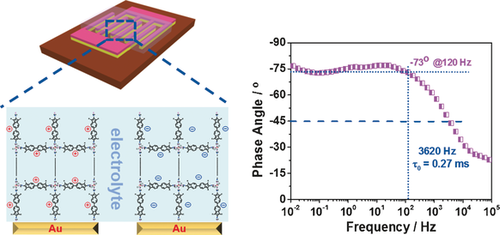On-chip micro-supercapacitors (MSCs) are important Si-compatible power-source backups for miniaturized electronics. Despite their tremendous advantages, current on-chip MSCs require harsh processing conditions and typically perform like resistors when filtering ripples from alternating current (AC). Herein, we demonstrated a facile layer-by-layer method towards on-chip MSCs based on an azulene-bridged coordination polymer framework (PiCBA). Owing to the good carrier mobility (5 x 10(-3) cm(2)V(-1) s(-1)) of PiCBA, the permanent dipole moment of azulene skeleton, and ultralow band gap of PiCBA, the fabricated MSCs delivered high specific capacitances of up to 34.1 Fcm(-3) at 50 mV s(-1) and a high volumetric power density of 1323 W cm(-3). Most importantly, such MCSs exhibited AC line-filtering performance (-73 degrees at 120 Hz) with a short resistance-capacitance constant of circa 0.83 ms.

On-chip micro-supercapacitors (MSCs) are important Si-compatible power-source backups for miniaturized electronics. Despite their tremendous advantages, current on-chip MSCs require harsh processing conditions and typically perform like resistors when filtering ripples from alternating current (AC). Herein, we demonstrated a facile layer-by-layer method towards on-chip MSCs based on an azulene-bridged coordination polymer framework (PiCBA). Owing to the good carrier mobility (5 x 10(-3) cm(2)V(-1) s(-1)) of PiCBA, the permanent dipole moment of azulene skeleton, and ultralow band gap of PiCBA, the fabricated MSCs delivered high specific capacitances of up to 34.1 Fcm(-3) at 50 mV s(-1) and a high volumetric power density of 1323 W cm(-3). Most importantly, such MCSs exhibited AC line-filtering performance (-73 degrees at 120 Hz) with a short resistance-capacitance constant of circa 0.83 ms.
